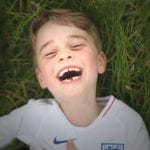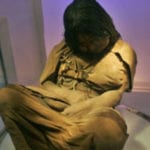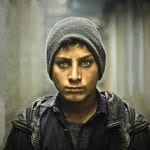 Weird Stuff
Weird Stuff  Weird Stuff
Weird Stuff  Health
Health Ten Confounding New Inventions from the World of Biomedicine
 Creepy
Creepy 10 Death Superstitions That Will Give You the Creeps
 Movies and TV
Movies and TV 10 Movies That Get Elite Jobs Right, According to Experts
 Weird Stuff
Weird Stuff 10 Times Real Laws Were Based on Bizarre Hypotheticals
 Animals
Animals 10 Inspiring Tales of Horses Being Human
 Mysteries
Mysteries Top 10 Haunting Facts About the Ghost Ship MV Alta
 History
History 10 Surprising Stories About the Texas Rangers
 Humans
Humans 10 Philosophers Who Were Driven Mad by Their Own Theories
 Miscellaneous
Miscellaneous 10 Video-Game-Worthy Weapons and Armors from History
 Weird Stuff
Weird Stuff 10 Warning Labels That Exist Because Someone Actually Tried It
 Health
Health Ten Confounding New Inventions from the World of Biomedicine
 Creepy
Creepy 10 Death Superstitions That Will Give You the Creeps
Who's Behind Listverse?

Jamie Frater
Head Editor
Jamie founded Listverse due to an insatiable desire to share fascinating, obscure, and bizarre facts. He has been a guest speaker on numerous national radio and television stations and is a five time published author.
More About Us Movies and TV
Movies and TV 10 Movies That Get Elite Jobs Right, According to Experts
 Weird Stuff
Weird Stuff 10 Times Real Laws Were Based on Bizarre Hypotheticals
 Animals
Animals 10 Inspiring Tales of Horses Being Human
 Mysteries
Mysteries Top 10 Haunting Facts About the Ghost Ship MV Alta
 History
History 10 Surprising Stories About the Texas Rangers
 Humans
Humans 10 Philosophers Who Were Driven Mad by Their Own Theories
 Miscellaneous
Miscellaneous 10 Video-Game-Worthy Weapons and Armors from History
Top 10 Poster Children Of The Syrian Civil War
The Syrian Civil War reached its seventh anniversary on March 15 this year. Assad is still in power, the Free Syrian Army (FSA) is still trying to kick him out, and several countries and groups have joined in the fighting. Each has its own agenda, causing the war to spiral into lots of confusing mini-wars.
So far, the clear winners are the Kurdish rebels, who hope to get more autonomy from the Syrian government and, if they are lucky enough, carve their own country out of Syria, as well as the Syrian military, which is supported by Russia, Iraq, Iran, and Hezbollah.[1]
Away from the chaos of the war are the innocent youths who have become unwilling poster children of the conflict. A poster child is one whose picture is used to raise awareness about a cause. In this case, the cause is the Syrian war. Most of the children never knew of their fame since they only became poster children after their deaths.
Be warned: The following pictures and videos may be disturbing.
10 Sahar Dofdaa
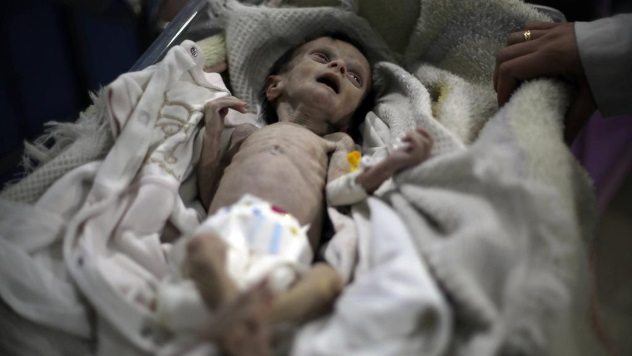
In 2017, one-month-old Sahar Dofhaa became a poster child of the Syrian Civil War after her pictures were released by Agence France-Presse (AFP). She was severely malnourished and weighed less than 2 kilograms (4.4 lb). Her bones protruded from her almost muscleless body, and her eyes had sunk into their sockets.
Considering her age, she was still being fed on breast milk, but her mother was too malnourished to produce any milk. Sahar was taken to a hospital in Hamouria, Ghouta, Syria, where she later died despite attempts to save her life.
The city of Ghouta was under the control of Syrian rebels as at the time of the incident and was under a siege and assault by the Syrian military. The assault led to sharp increases in food prices. The scarcity of food was worsened due to hoarding by sellers and infighting among the rebel factions in the city.[2]
9 Omran Daqneesh
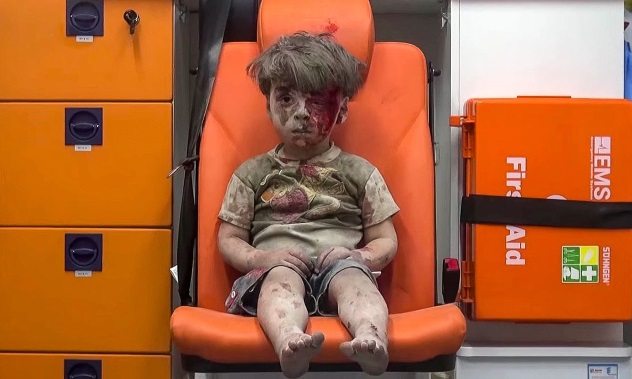
Five-year-old Omran Daqneesh became a poster child of the Syrian war after a picture of him sitting in the back of an ambulance surfaced on the Internet in 2016. The left side of his face was bloodied, and he was covered in dust. He had just been rescued from a building supposedly hit by an airstrike. We will return to why we say “supposedly” shortly.
The image was actually extracted from a video shot by Aleppo Media Centre, which supports the rebels fighting against Assad’s government. Omran was not the only one affected by the supposed airstrike. His parents and siblings were also rescued from the apartment, which itself collapsed soon after they were evacuated.
Photos of Omran made their way to the Internet again a year later. This time, he sported a lower haircut, and there were no visible signs of his earlier injuries. His family had also moved from the rebel-held neighborhood where they were bombed to government-controlled territory.
Omran’s father, Mohammed, accused the rebels of using his son’s video and picture for propaganda. He added that he never heard the sound of an airplane flying overhead at the time his home was bombed. If anything, his statement means that the bombing could have been a deliberate action by the rebels, which, coupled with the consequent rescue, would make for an elaborate attempt at propaganda.[3]
8 Karim Abdallah
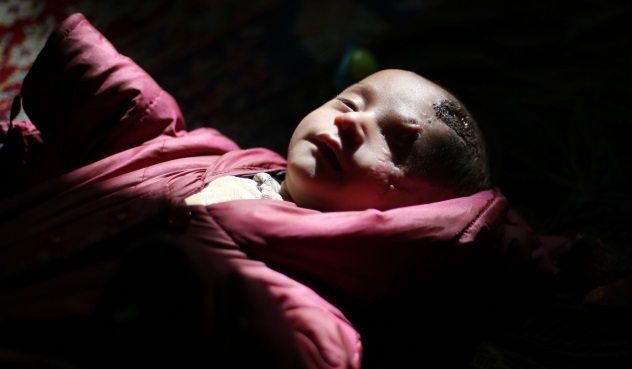
Karim Abdallah was just 40 days old when he lost an eye to an airstrike in a market in Ghouta, Syria, in 2017. The airstrike blinded his left eye, which now has a scar in its place, injured him in the head just above the scar, and killed his mother, who had been carrying him.
The airstrike had been targeted at a rebel fortification in the area, and Karim and his mother had been collateral damage. As the image of the scarred Karim spread through the world, supporters on social media shared photos of themselves covering one eye in solidarity with Karim.
According to Dr. Abu Jamil, a brain surgeon who had operated on the seriously wounded boy, the injury could have long-term effects, as Karim’s frontal lobe was also damaged. The frontal lobe is crucial for its role in intelligence, comprehension, and memory. Last we heard, Karim was being taken care of by an aunt.[4]
7 Rawan Alowsh
Five-year-old Rawan Alowsh became another poster child of the Syrian Civil War in 2016, after a video showing her being pulled out from the rubble of her destroyed home in Bab al-Nairab district, Aleppo, surfaced on the Internet. The area was under the control of rebel forces at that time and had come under heavy attack by the Syrian military. The airstrike itself was believed to have been launched by a Russian or Syrian jet.
The video starts with a man digging through the rubble to free Rawan, who is seen covered in dust. While there were claims that Rawan’s entire family perished in the airstrike, Time, which reported the incident, stated that they could not verify the claim.[5]
6 Alan Kurdi
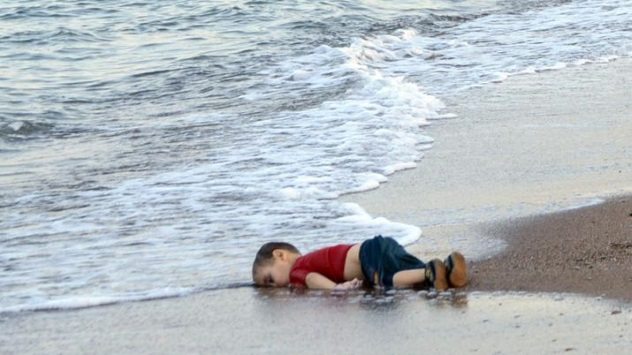
Three-year-old Alan Kurdi was one of the thousands of Syrians who have drowned in the Mediterranean Sea while fleeing war-torn Syria for Europe. In the early morning of September 2, 2015, he and his family boarded a dinghy in Bodrum, Turkey, for a journey to Greece.
Unfortunately, they never got to Greece, as the dinghy capsized into the rough sea minutes after they left the shore. Alan drowned in the accident alongside his father, mother, and older brother.
No one would have heard about Alan, just as we barely hear of the thousands more who have perished, if it weren’t for the fact that Turkish photographer Nilufer Demir took a picture of his body lying on the beach. Alan was lying facedown, with half of his body in the water and the other half on the sand.
The picture went viral, and Alan not only became a poster child of the war but for the hundreds or possibly thousands of children who have died while crossing the Mediterranean. He was not even the only child who died during the mishap. According to Demir, Alan was just one of the children on the beach the day she took the picture. In her words, the beach resembled a “children’s graveyard.”[6]
5 Hamza Ali Al-Khateeb

Hamza Ali Al-Khateeb was only 13 when he became the poster child of the Syrian uprising, which metamorphosed into the ongoing war. In 2011, Hamza was protesting against the government of Assad and had been following his family and several other protesters to break the siege on the city of Deraa, which had been besieged by Syrian forces, when they were fired upon by the Syrian military.
Everyone broke away and fled, but Hamza was shot and captured. His family only knew of his whereabouts weeks later, when they learned he was being held in a prison. They visited the prison, where they begged the guards to release Hamza because he was underage, but the guards refused.
Hamza’s father visited the prison again and was informed that his son was in a hospital. What he was not told was that his son was in the hospital’s morgue. The cause of Hamza’s death remains a controversy even today. The Syrian government claims he died of the gunshot wounds he sustained during his arrest, while the opposition says he was beaten and shocked to death.
The bone of contention was a video showing Hamza’s bruised and battered corpse, which the opposition says is enough evidence of the torture he received in the hands of the Syrian military. His eyes were blackened and swollen, his genitals were cut off, and his hands and neck were broken. The Syrian government stated that Hamza’s body appeared disfigured because it was decomposing.[7]
4 Baby Amel
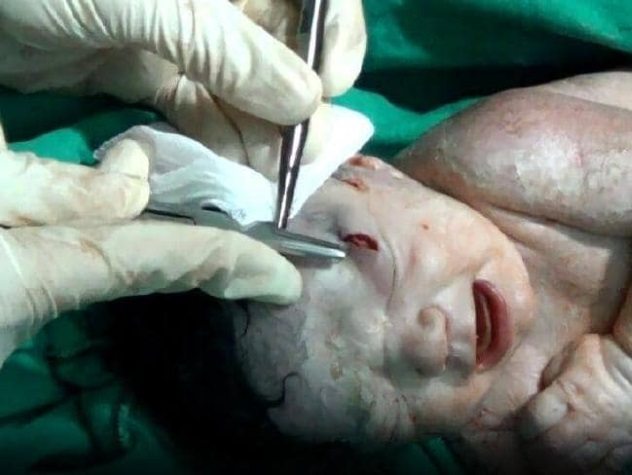
Baby Amel became a casualty of the Syrian Civil War even before she was born. Her mother was nine months pregnant when she was injured alongside three of her children during an airstrike on Aleppo in 2015. Amira’s children suffered minor injuries, while she herself was injured by shrapnel from the explosion. She was rushed to a hospital, where she underwent an emergency procedure to deliver her baby.
The baby was born alive, but she had shrapnel lodged above her left eye. It was obvious that the shrapnel had entered Amira’s belly and embedded just above her baby’s eye. The incident surprised doctors, who were unsure whether it was the mother who saved the baby’s life or the baby who save the mother’s life. The baby was christened Amel.[8]
3 Aya
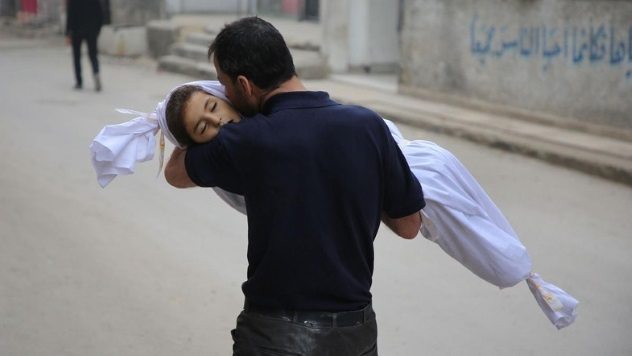
Six-year-old Aya was killed in an airstrike launched by the the Syrian Arab Air Force on Arbin, Syria, in 2018. The airstrike killed an adult and another child, bringing the casualties to three. Aya became a poster child of the war after a picture of her father carrying and kissing her just before she was to be buried surfaced. Aya’s mother screamed during the funeral, saying her daughter was only sleeping, and pleaded to be allowed to take Aya’s body away from the service.
As heartbreaking as this sounds, Aya was not the only one who became a poster child because of a photograph taken just before they were to be buried.
An unnamed boy also shared a similar fate. He was killed in an airstrike in Eastern Ghouta in 2018 and was carried by his father just before he was to be buried. In a series of images, the mourning father can be seen carrying the boy from the back of a flatbed truck, where his remains were laid alongside other casualties of the airstrike. He hugged his late son for some moments before returning him back.[9]
2 Unnamed Baby
In 2016, Mayissa was in labor and making her way to a hospital in Aleppo when one of the belligerents of the war dropped a bomb. Shrapnel from the explosion struck her belly and broke her arm and leg. Doctors, fearing that Mayissa’s unborn child might have been killed in the bombing, quickly organized a caesarean section.
The doctors were almost right about their fears, as the baby had no heartbeat at birth. Quickly, they cleared his airways and gave him an injection in the umbilical cord before a doctor held him upside down while slapping and rubbing his back. It was at this moment that the baby started crying. The video of the birth was aired on Channel 4 News in Britain. The segment was titled “Children of Aleppo: The baby born in a barrel bomb attack.”[10]
1 Bana Al-Abed
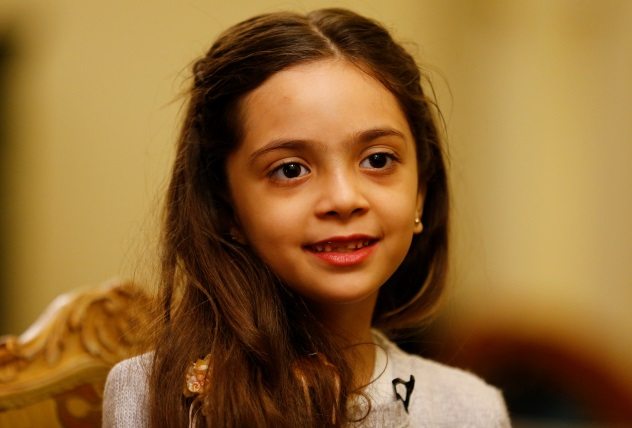
Bana al-Abed is probably the most famous of all poster children of the Syrian war. She is so famous that Time magazine listed her, eight years old at the time, among the most influential people on the Internet in 2017, in a list that included Donald Trump and Kim Kardashian. Caitlin Gibson of The Washington Post even called her the “Anne Frank of the Syrian Civil War.”
Unlike the others on this list, she was neither injured, starving, nor dead before she became a poster child. Her claim to fame is Twitter, where she tweeted about real-life events before the city of Aleppo, where she lived, was retaken by Syrian forces. As at the time she started tweeting, Aleppo was occupied by rebels and came under constant shelling by the Syrian military.[11]
Considering such popularity, Bana did not fail to generate series of controversies among the belligerents of the war. The rebels and their supporters say Bana’s tweets are a verifiable claim to the atrocities being committed by the Syrian military. Assad and his supporters dismiss her Twitter account as nothing but an elaborate attempt at propaganda.
One of the bones of contention is the fact that Bana tweets and makes videos in English, which she barely understands. This is despite the fact that her Twitter bio already explained that her mother, who understands English and worked as a English teacher before the war, handled all translations and taught her English.
Questions were also raised about the fact that Bana was able to keep the phone charged despite the blackout consistent with the city under attack. Bana later revealed that her family had a solar panel they used to charge their phones. However, this was not enough to convince Assad’s supporters, who still believe there is more to the Twitter account.
Read about more terrible civil wars from around the world on Top 10 Shameful Civil Wars As Complex And Bloody As Syria’s and 10 Bloody And Shameful Civil Wars.
